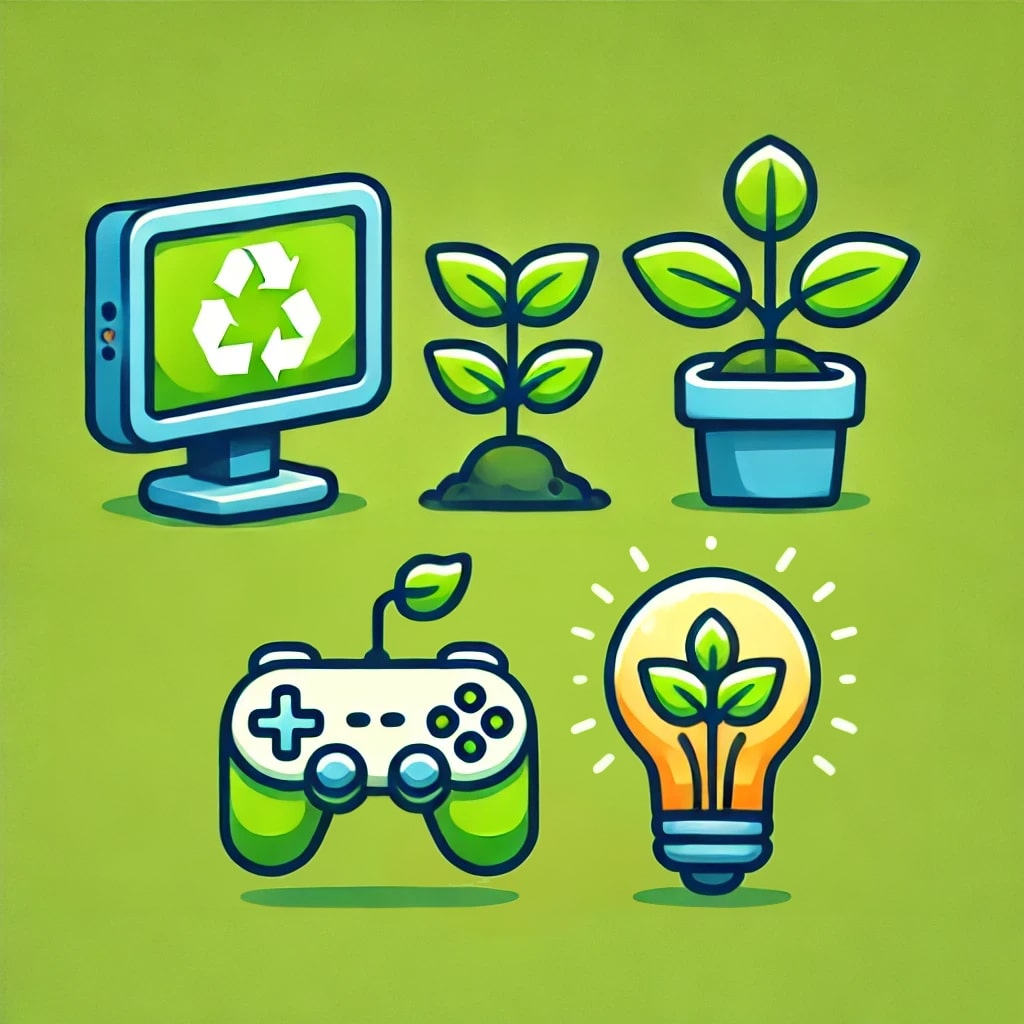Introduction
In an era where sustainability is more than just a buzzword, game developers increasingly focus on eco-friendly practices. This shift isn’t just about aligning with global trends—it’s about ensuring a future for both the gaming industry and our planet. With the game development community growing exponentially, there’s an urgent need to consider the environmental ramifications of our digital creations.
In this post, we’ll explore various strategies to make game development more sustainable. We’ll cover everything from energy-efficient coding practices to the importance of green hosting solutions. By the end, you’ll have a toolkit of actionable insights to make your next project greener and more efficient.
The Environmental Impact of Gaming
The Carbon Footprint of Game Development
Creating and playing games require considerable energy. From the electricity used to power servers and data centers to the resources needed for game consoles, the carbon footprint of gaming is substantial. Studies show that the gaming industry contributes to 2-3% of global greenhouse gas emissions. Addressing this issue begins with understanding the scope of our environmental impact.
E-Waste and the Gaming Industry
E-waste is another significant concern. The rapid advancement in gaming technology means that outdated hardware is frequently discarded. E-waste contains toxic substances that can harm the environment. To combat this, developers can design games that are compatible with older hardware, reducing the need for constant upgrades.
Sustainable Packaging for Physical Games
Although digital downloads are becoming more popular, physical game copies remain prevalent. The packaging for these games often involves non-recyclable materials. Developers and publishers can opt for eco-friendly packaging solutions, such as recycled cardboard and biodegradable plastics, to minimize environmental harm.
Energy-Efficient Coding Practices
Optimize Game Performance
Energy-efficient coding isn’t just good for the environment; it enhances game performance. Reducing your game’s computational load can significantly reduce energy consumption. Techniques such as efficient loop structures, minimalistic graphic rendering, and optimized algorithms are crucial.
Use Renewable Energy for Game Development
Consider using renewable energy sources to power your development environment. Solar panels, wind turbines, and other renewable energy solutions can drastically reduce your carbon footprint. Many tech companies are already making this shift, proving that it’s both feasible and beneficial.
Green Software Architecture
Adopting green software architecture means designing your software as energy-efficient as possible. This involves writing cleaner code, reducing redundancy, and optimizing resource management. Tools and frameworks that support green architecture can help you implement these practices effectively.
Green Hosting Solutions
Eco-Friendly Data Centers
Data centers consume a massive amount of energy. Opting for hosting solutions that use eco-friendly data centers can make a significant difference. These centers utilize renewable energy sources and have more efficient cooling systems, reducing their environmental impact.
Server Optimization
Optimizing server usage is another way to reduce energy consumption. Load balancing, server virtualization, and efficient database management can help you maximize your server resources. This not only cuts down on energy use but also improves the performance and reliability of your game.
Cloud Computing for Sustainability
Cloud computing offers scalable and flexible solutions with lower energy consumption. Major cloud providers like Google, Amazon, and Microsoft are investing in renewable energy to power their data centers, making cloud computing a more sustainable option.
Sustainable Game Design
Minimalist Game Design
Minimalist game design focuses on simplicity, using fewer resources to create an engaging experience. This approach reduces the environmental impact and appeals to a growing audience that appreciates simplicity and elegance in game design.
Extending Game Lifespan
Designing games that have a longer lifespan can also contribute to sustainability. Games with frequent updates, expansions, and modding communities encourage players to continue playing without new hardware or software, reducing e-waste and resource consumption.
Eco-Themed Games
Creating games with environmental themes raises awareness and educates players about sustainability. These games can inspire players to take action in their own lives, multiplying the positive impact of your eco-friendly efforts.
Collaborating for a Greener Future
Industry Partnerships
Collaborating with other developers, publishers, and organizations can amplify your sustainability efforts. Industry partnerships can lead to development of new technologies and standards that benefit the entire gaming community.
Community Involvement
Engage your player community in your sustainability efforts. Encourage feedback, suggestions, and participation in eco-friendly initiatives. A committed and informed community can drive meaningful change.
Green Certifications
Obtaining green certifications for your games and company can bolster your credibility and demonstrate your commitment to sustainability. Certifications from organizations like the Green Electronics Council or ENERGY STAR can set your brand apart.
Implementing Eco-Friendly Workspaces
Remote Work
Remote work significantly reduces the carbon footprint associated with commuting and office energy consumption. Encouraging your team to work from home, even part-time, can make a substantial difference.
Sustainable Office Practices
Implementing sustainable practices can reduce environmental impact when office work is necessary. Use energy-efficient lighting, recycle waste, and encourage reusable materials.
Green Commuting Options
Promoting green commuting options like cycling, carpooling, or public transportation can reduce your overall carbon footprint if your team must commute. Offering incentives for eco-friendly commuting can further encourage these practices.
Measuring and Reporting Sustainability Efforts
Sustainability Metrics
Implementing metrics to measure your sustainability efforts is crucial. Track energy consumption, waste production, and resource use to identify areas for improvement. Reviewing these metrics can help you stay on track and make data-driven decisions.
Transparent Reporting
Transparency in reporting your sustainability efforts builds trust with your community and stakeholders. Regular updates on your progress and challenges demonstrate your commitment and encourage others to follow suit.
Continuous Improvement
Sustainability is an ongoing process. Continually seek new ways to reduce your environmental impact and improve your practices. Staying informed about the latest developments in eco-friendly technology and practices can help you stay ahead.
Conclusion
Sustainable game development is not just a trend—it’s a necessity. By adopting eco-friendly practices, game developers can significantly reduce their environmental impact while improving game performance and player satisfaction. Whether through energy-efficient coding, green hosting solutions, or sustainable game design, every step toward sustainability counts.
Start implementing these practices today and join the growing community of developers committed to creating a greener future. For personalized advice and support, consider reaching out to experts who can help you refine your strategies and achieve your sustainability goals!


